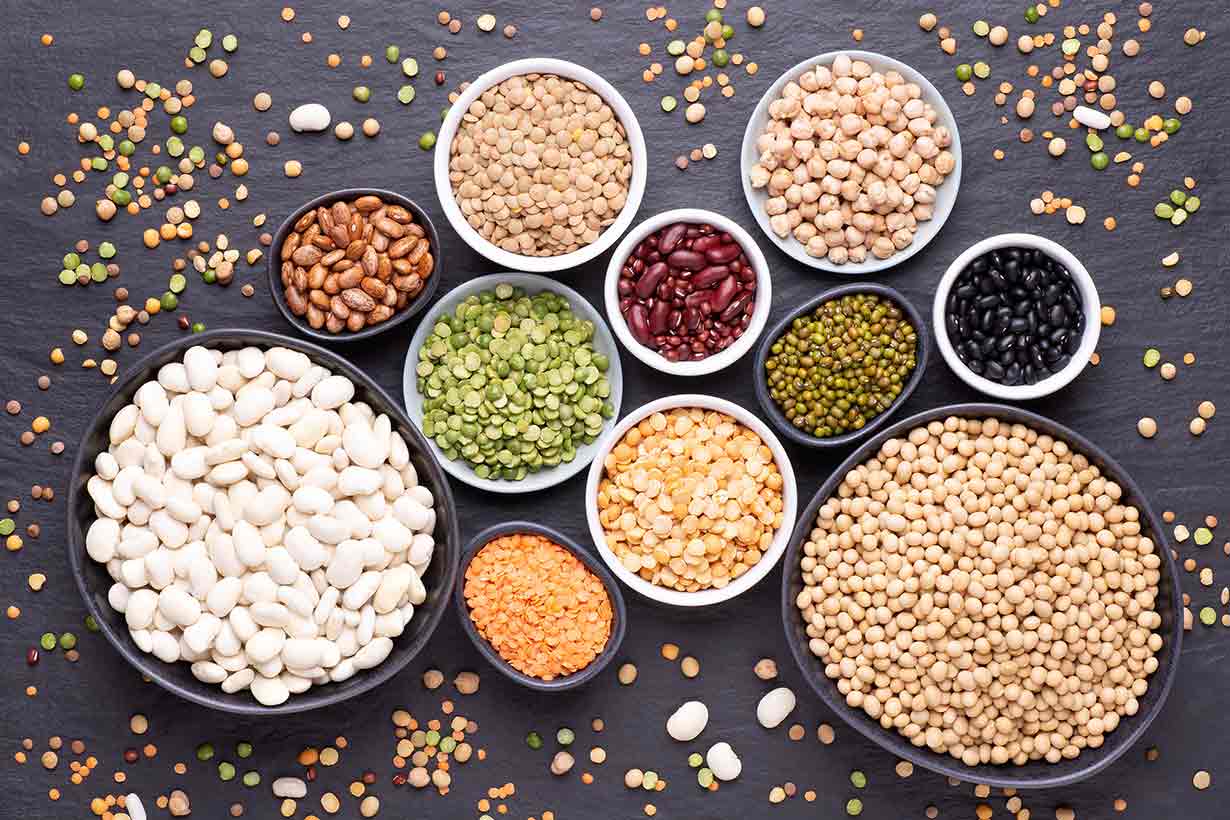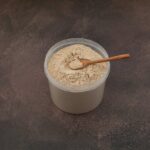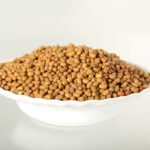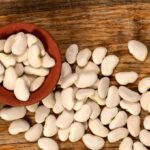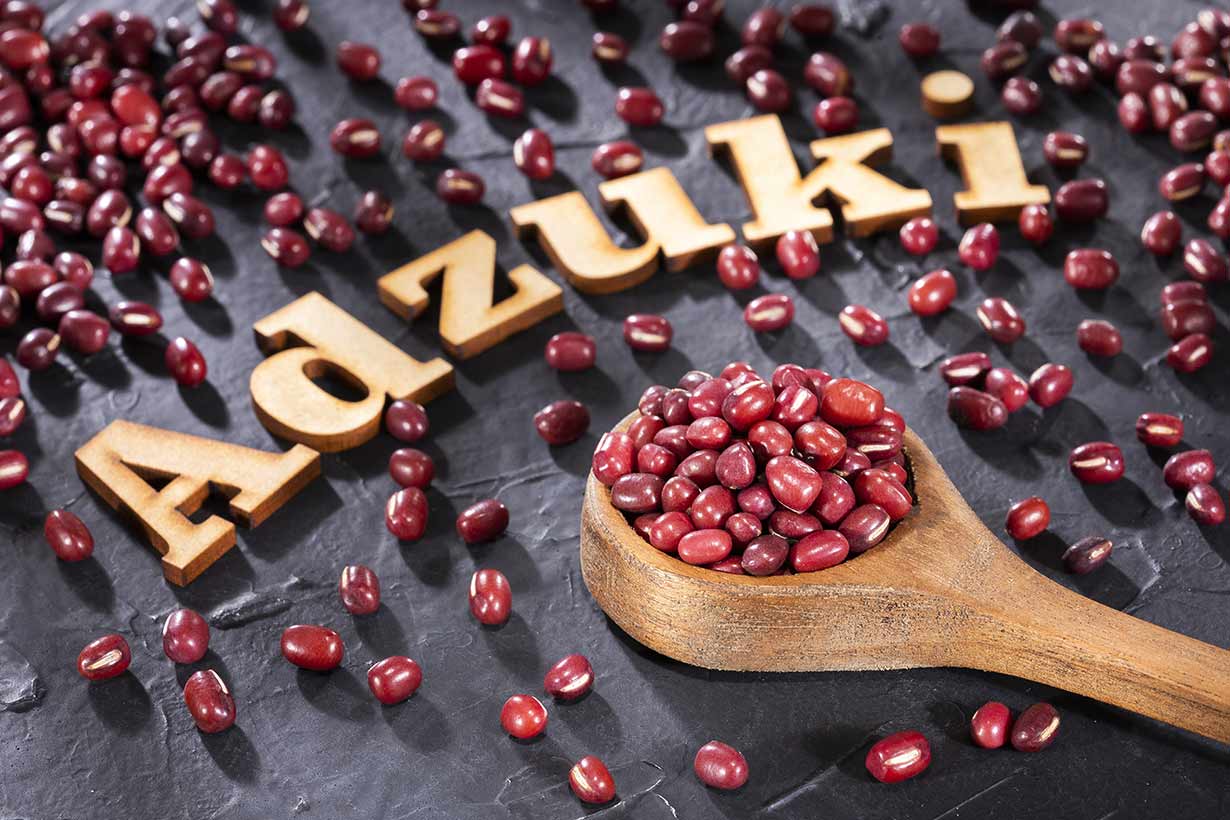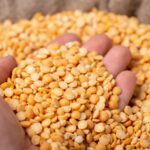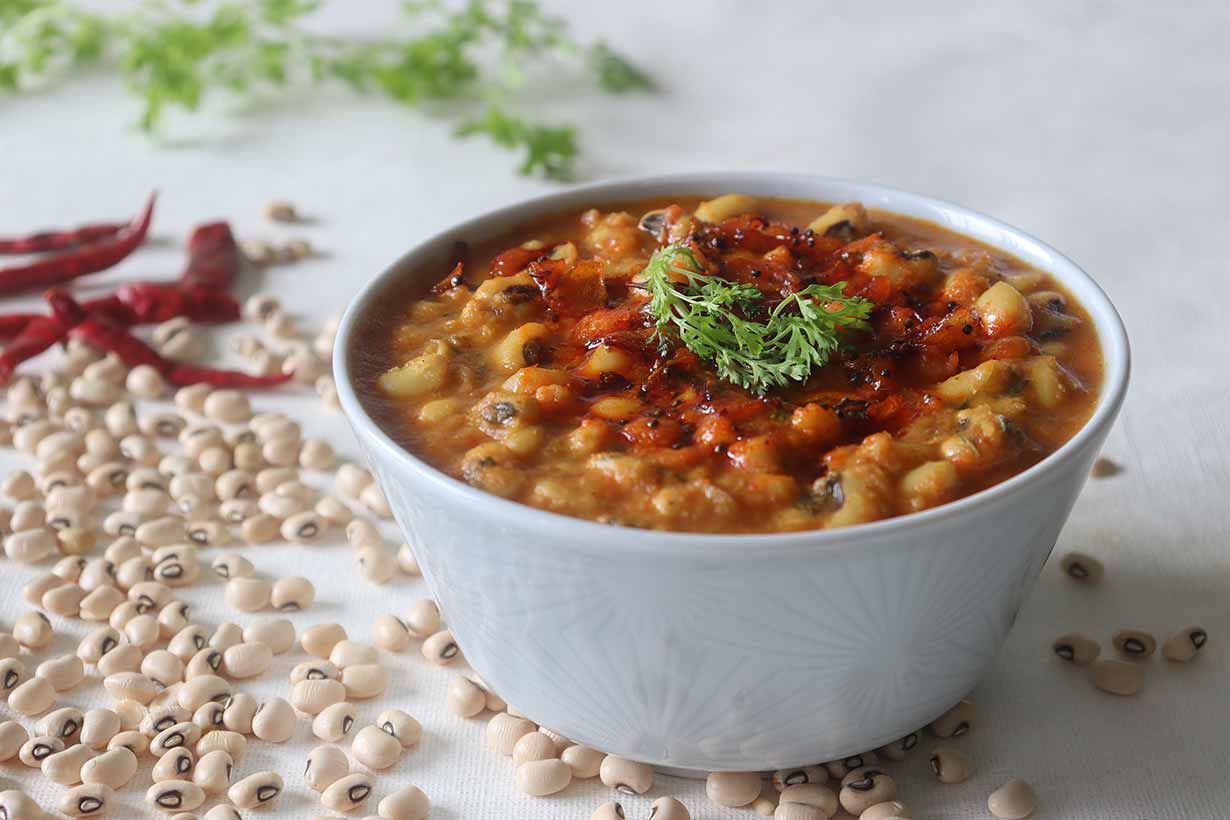This article examines the potential nutritional benefits of extra firm tofu.
Furthermore, we explore its full nutritional profile, how it compares to other tofu products, discuss potential drawbacks, and offer a guide on cooking with it.
What Is Extra Firm Tofu?
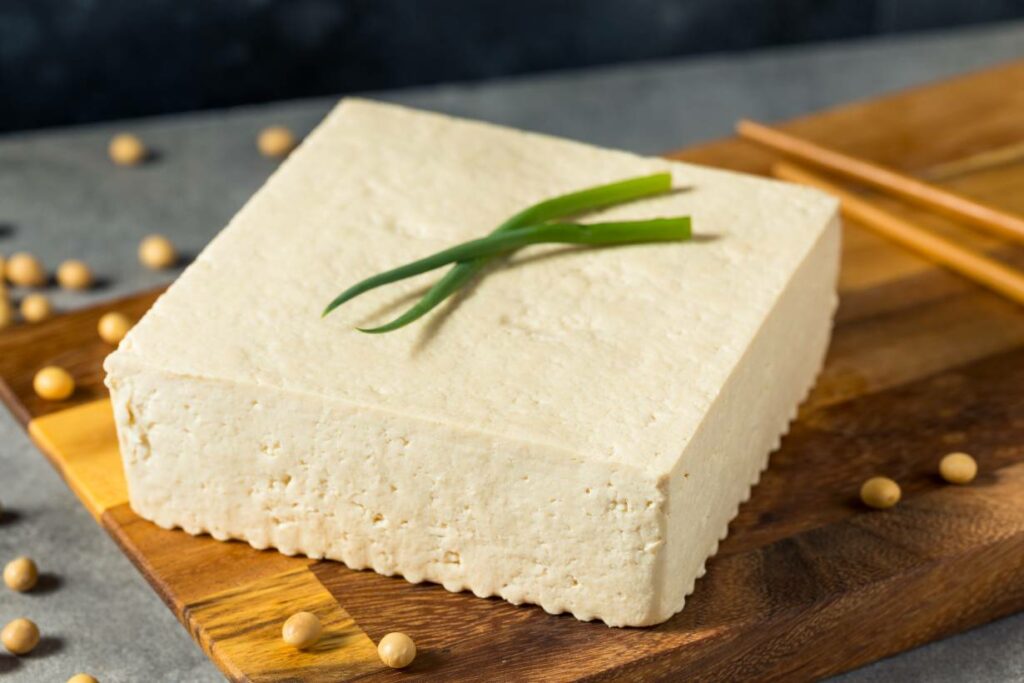
To begin, let’s briefly summarize what extra firm tofu is and its distinctive characteristics.
Tofu comes in several forms, and it is a popular plant-based protein source made from soybeans. Like other legume-based foods, its nutritional value isn’t solely determined by its protein content, and it also provides a broad range of nutrients.
As its name suggests, extra firm tofu is distinguishable by its firmer consistency compared to regular, ‘soft’, and ‘silken’ tofu variations.
The firmness comes from the manufacturing process and its final water content. Being pressed for longer with greater pressure removes more water from the tofu, giving it a firmer and more solid texture.
Given its firmer texture than other tofu products, extra firm tofu is a useful ingredient for dishes like curries and stir-fries. In this context, it is much less prone to breaking apart.
In terms of nutritional content, extra firm tofu contains a comparable proportion of nutrients to other tofu products. However, as it has a lower water content and a higher amount of soybean solids, it offers increased nutritional value.
NB: while tofu is traditionally and most commonly made from soybeans, it is also possible to make tofu from other legumes, such as yellow split peas.
Benefits of Extra Firm Tofu
Firstly, let’s examine some of the benefits that extra firm tofu can provide.
1) Extra Firm Tofu Is High in Protein
One of the primary nutritional benefits offered by extra firm tofu revolves around its exceptional protein content.
According to USDA data, a 3.5-ounce (100-gram) serving provides 9.98 grams of protein (1).
Furthermore, extra firm tofu is relatively low in calories, with only 83 calories per 100 grams. In other words, this tofu product is quite protein-dense.
Here is a breakdown of the protein and calorie provision among varying serving sizes of extra firm tofu:
- 100 grams: 9.98 grams of protein, 83 calories
- 200 grams: 19.96 grams of protein, 166 calories
- 300 grams: 29.94 grams of protein, 249 calories
- 400 grams: 39.92 grams of protein, 332 calories
It is evidence that extra firm tofu has an impressive protein-to-calorie ratio compared to most plant-based foods. Alongside foods like tempeh and seitan, it is one of the most protein-dense plant-based foods.
2) Provides a Significant Source of Calcium
Calcium is an essential mineral that plays a key role in bone health (2).
Soybeans, the primary ingredient of tofu, contain a good amount of calcium in their raw state (3). Consequently, all tofu products will provide a high level of this essential mineral.
However, the production process of extra firm tofu can often lead to an increased calcium intake above this level. This occurs due to the use of calcium sulfate as a coagulant in certain tofu products, which aids in thickening and firming them (4).
Since calcium sulfate is a source of calcium, its use as a coagulant adds supplementary calcium to the tofu.
Unfortunately, the ‘extra firm tofu’ product listed in the USDA database is one not prepared using calcium sulfate. It has 282 mg of calcium per 100 grams, equivalent to 22% of the daily value for calcium (1, 5).
Tofu products labeled as ‘prepared using calcium sulfate’ can have significantly higher calcium levels, reaching approximately double this amount.
3) More Nutrient-Rich Than Other Tofu Products
As previously indicated, extra firm tofu has a reduced water content compared to other tofu variants. Soft, silken, regular, and firm tofu all contain more water due to undergoing less pressing.
Resulting from its lower water content, extra firm tofu provides a higher concentration of soybean solids gram for gram. This being the case, extra firm tofu offers elevated nutrient content but also higher calorie levels relative to other tofu varieties.
For example, the table below shows the typical calorie and protein content of extra firm tofu in comparison to other tofu varieties per 100 grams (1, 6, 7):
| Tofu variety | Calories | Protein content |
|---|---|---|
| Extra firm | 83 kcal | 9.98 g |
| Regular | 76 kcal | 8.08 g |
| Silken, soft | 55 kcal | 4.8 g |
For individuals wanting the highest optimal protein, vitamin, and mineral intake, extra firm tofu is demonstrably the best option. Conversely, those seeking the lowest-calorie option would find silken soft tofu the better choice.
While on this topic, it is worth highlighting the substantial nutritional differences among tofu varieties. For example, a traditional fermented tofu product exists that contains beneficial bacteria.
4) A Selenium-Rich Food
In addition to calcium, selenium is another essential mineral provided in abundant amounts by extra firm tofu.
Selenium is a mineral that plays a vital role in the body’s antioxidant system. In this context, numerous antioxidant enzymes are ‘selenium-dependent,’ signifying their reliance on this mineral for proper functioning (8, 9).
Selenium is also thought to be important for the proper function of the immune system, and it may help to regulate inflammatory and immune responses (10, 11).
Extra firm tofu boasts a selenium content of 13 mcg per 100 grams, which translates to 24% of the daily value (1, 5).
5) May Have Benefits For Heart Health
Another potential benefit of extra firm tofu revolves around its potential positive impact on cardiovascular health.
On this note, several studies have demonstrated potential benefits from tofu and soy intake as a whole.
A randomized controlled trial involving forty-five healthy adult men examined the effect of replacing meat with tofu. The study compared a month of consuming 150 grams of lean meat daily against a month of consuming 290 grams of tofu daily. Beyond these two foods, the diets were designed to be as comparable as possible. The study’s outcomes noted significantly lower total cholesterol, triglycerides, and lipoprotein A on the tofu diet, all of which function as markers of cardiovascular risk (12).
A meta-analysis of observational studies published in 2017 examined the association between soy and the risk of cardiovascular disease. Over a cumulative seventeen studies, a substantial association emerged between higher soy intake and a lower risk of cardiovascular disease, stroke, and coronary heart disease (13).
Furthermore, a cumulative meta-analysis of 46 randomized controlled trials on soy, published in 2019, investigated the health effects of soy consumption. The findings from this meta-analysis demonstrated that soy intake contributes to a significant mean reduction in low-density lipoprotein cholesterol (LDL-C) (14). Notably, LDL-C is a recognized marker of cardiovascular risk, as it increases the risk of cardiovascular disease, all else being equal (15).
How May Tofu Help To Lower Cardiovascular Risk?
There are several mechanisms by which tofu products may help to lower LDL-C. These include:
- Tofu’s fiber and unsaturated fat content (15, 16).
- The presence of bioactive compounds in soy-based foods called isoflavones (17, 18).
- The presence of bioactive peptides, composed of diverse chains of amino acids that can vary in effect and are found in protein sources (19).
- The overall diet context: what tofu is typically replacing in the diet. In other words, in some cases, the foods that tofu replaces in the diet may have been increasing LDL-C.
Full Nutritional Profile of Extra Firm Tofu
Using nutritional data from the USDA FoodData Central database, the subsequent tables present the full nutritional values for extra firm tofu per 3.5-ounce (100-gram) serving (1).
Percent daily values (% DV) have been calculated using the aforementioned USDA data and the FDA’s published daily values (5).
| Name | Amount | % Daily Value |
|---|---|---|
| Calories | 83 kcal | |
| Carbohydrates | 1.18 g | 0.4% |
| Fiber | 1.0 g | 3.6% |
| Sugars | 0.71 g | |
| Fat | 5.26 g | 6.7% |
| Saturated | 0.92 g | 4.6% |
| Monounsaturated | 1.32 g | |
| Polyunsaturated | 2.66 g | |
| Omega-3 | 0.26 g | |
| Omega-6 | 2.39 g | |
| Protein | 9.98 g | 20.0% |
| Cholesterol | 0 mg | 0% |
Vitamins
| Vitamin | Amount | % Daily Value |
|---|---|---|
| Choline | 33.0 mg | 6.0% |
| Folate | 9.0 mcg | 2.3% |
| Vitamin A, RAE | 0 mcg | 0% |
| Vitamin B1 (thiamin) | 0.05 mg | 4.2% |
| Vitamin B2 (riboflavin) | 0.05 mg | 3.8% |
| Vitamin B3 (niacin) | 0.24 mg | 1.5% |
| Vitamin B5 (pantothenic acid) | 0.84 mg | 16.8% |
| Vitamin B6 (pyridoxine) | 0.08 mg | 4.7% |
| Vitamin B12 (cobalamin) | 0 mcg | 0% |
| Vitamin C | 0 mg | 0% |
| Vitamin D | 0 mcg | 0% |
| Vitamin E | 0.01 mg | <1% |
| Vitamin K | 2.80 mcg | 2.3% |
As the table shows, extra firm tofu contains a broad range of vitamins, and it is particularly high in pantothenic acid.
Minerals
| Mineral | Amount | % Daily Value |
|---|---|---|
| Calcium | 282 mg | 21.7% |
| Copper | 0.2 mg | 22.2% |
| Iron | 2.04 mg | 11.3% |
| Magnesium | 35 mg | 8.3% |
| Manganese | 0.67 mg | 29.1% |
| Phosphorus | 111 mg | 8.9% |
| Potassium | 130 mg | 2.8% |
| Selenium | 13 mcg | 23.6% |
| Sodium | 4 mg | 0.2% |
| Zinc | 1.07 mg | 9.7% |
The table demonstrates that extra firm tofu provides more than 10% of the daily value for calcium, copper, iron, manganese, and selenium.
Safety Precautions and Allergies
Generally speaking, extra firm tofu is a perfectly safe food with no evident nutritional downsides. However, it is prudent to consider a few factors related to safety precautions and potential allergies.
Soy Allergy
First of all, soybeans are the single ingredient from which tofu is made. Moreover, soy ranks as one of the nine major food allergens alongside wheat, sesame, milk, eggs, fish, crustacean shellfish, tree nuts, and peanuts (20).
For this reason, extra firm tofu (and all tofu products) is unsuitable for consumption by an individual with a soy allergy.
Anyone with a suspected soy allergy should refrain from eating tofu and consult with their doctor or a trusted medical professional.
General Storage and Preparation
Aside from soy allergies, here are some further precautions to bear in mind when incorporating extra firm tofu:
- Tofu is a perishable food: it should be stored in the refrigerator to prevent spoilage.
- Shelf life: since tofu can spoil, it typically has a relatively short shelf life. Most extra firm tofu will typically have a ‘use by’ date set one or two weeks after the purchase date. However, it should be consumed quicker once opened; the packaging usually advises on how many days this should be within.
- Proper storage: once opened, the best way to store tofu is immersed in water in the refrigerator, with a daily water change.
How To Cook Extra Firm Tofu
Extra firm tofu is a versatile ingredient that can easily integrate into a multitude of dishes. The firm texture that it provides lends itself to a wider array of dishes than its softer tofu counterparts.
Here are some culinary ways in which we can use extra firm tofu:
- Curries, soups, and stews: adding some extra firm tofu lends a chewy texture to your favorite curries, soups, and stews.
- Oven-baked marinated tofu: either cut the tofu into cubes or elongated slices and then marinate them in a chosen sauce. After allowing the tofu to marinate for an hour or so, place it into a preheated oven at 392°F (200°C) for approximately 30 minutes, until the tofu’s exterior is slightly crispy. Ingredient options such as soy sauce, tomato paste, herbs and spices, sesame seeds, garlic, ginger, and olive oil are all great options for including in a marinade.
- Pan-fried marinated tofu: cut the extra firm tofu into small cubes and then marinate. After leaving to marinate for an hour, pan-fry the tofu until the outer sides of the cubes are crispy.
- Stir-fries: the harder texture of extra firm tofu makes it more suitable for stir-frying than other tofu varieties. Just cut it into cubes and add to a stir-fry.
- Salads: extra firm tofu cut into cubes can also be a good fit for a salad and an ideal way to elevate the salad’s protein content.
Final Thoughts
As shown throughout this article, extra firm tofu is a flexible ingredient that provides a good source of protein. In this context, it offers more than other varieties of tofu.
It offers a good range of nutritional benefits, and it is one of the best plant-based protein options.
For those who can consume soy products, extra firm tofu offers rewarding nutritional value for relatively few calories.

